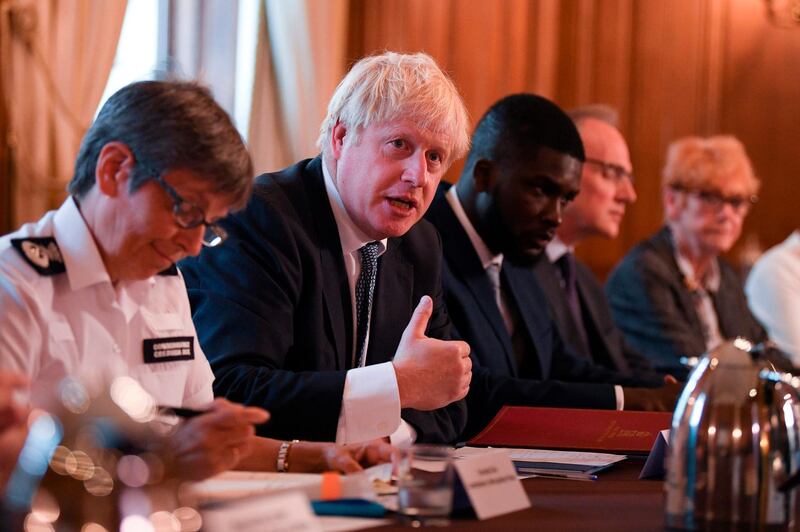The new British government has rejected criticism of its hard-line approach to crime and is considering longer sentences for the most dangerous offenders.
Prime Minister Boris Johnson has launched a raft of measures since his appointment last month, from increased prison places, 20,000 more police officers and an extension of the controversial stop-and-search policy. It is widely believed he is trying to solidify grass roots support before a potential election campaign amid the ongoing Brexit turmoil.
Mr Johnson, who often talks up his anti-crime stance when he was London Mayor, says he wants criminals, and not the public, “to be afraid” amid a spate of stabbings in the capital.
Yesterday @BorisJohnson announced 10,000 new prison places to keep criminals behind bars.
— Conservatives (@Conservatives) August 12, 2019
📰 Read the Prime Minister's article: https://t.co/inNjUardDO pic.twitter.com/0UKXpyMcsK
"I want to see knives taken off our streets. We have done it before, more than ten years ago, when London faced an identical spate of knife crime and violence at the beginning of my first term as Mayor. We can do it again," he wrote in the Mail on Sunday.
Changes now mean police in England and Wales can now more easily stop and search suspects, a move that Mr Johnson accepted was “controversial”. Critics say it unfairly targets people of colour.
“Boris Johnson’s criminal justice reforms are a monumental waste of money. His proposed sentencing reforms ignore evidence that shows that longer prison sentences are ineffective at deterring crime or reducing reoffending,” said Charlotte Pickles, director of the Reform think tank.
“His unequivocal embrace of stop and search is dumbfounding — research shows it does little to prevent violence. Intelligent investment is clearly needed, but these pledges are costly election baubles, not a serious attempt to make this country safer,” she said.
However, Justice Secretary Robert Buckland has defended the move and said the police supported it.
"We're not going back to a system of indiscriminate stop and search, based on the colour of somebody's skin, that would be wholly wrong," he told LBC Radio.
"But we are moving to a system where the police are freer and more able to target and prioritise particular issues in areas of concern to them, to use these powers in an effective way."
On Monday, Mr Johnson ordered a review over the sentencing policy for violent and sexual offenders over “whether they are serving sentences that truly reflect the severity of their crimes”.
It will consider how to break the cycle of repeat defenders and assess sentencing guidelines. The Crown Prosecution Service will also be given £85 million (Dh377m).
“To ensure confidence in the system, the punishment must truly fit the crime. We have all seen examples of rapists and murderers let out too soon or people offending again as soon as they’re released,” Mr Johnson said.
“This ends now. We want them caught, locked up, punished and properly rehabilitated,” he added.







